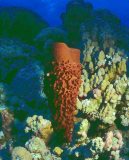Thursday, May 25, 2006
Creature of the Month: Tube Sponge, Acervochalina sp
 With their varied colours and intricate shapes, sponges
With their varied colours and intricate shapes, spongesadd beauty to the reef or rock. Some sponges are
greenish, violet or pinkish in colour because they
harbour symbiotic algae. The more symbionts and light,
the stronger the colour. When there is low light
these sponges are a much paler colour - almost
white.
The sponge uses the algae as a source of oxygen, a
screen against sunlight and as a food source. The
algae profit by a secure habitat.
Sponges are amongst the simplest members of the animal
kingdom. They have no digestive, nervous or
circulatory systems for example.
The lack of sophistication in sponges has been shown in
a classic experiment. A sponge was pushed through fine
silk to completely break it down. However, it soon
succeeded in resassembling itself.
A sponge feeds by drawing water into its central cavity
through its pores - the tiny holes covering its body.
The filtered water leaves through the big outlet pores.
Our picture (http://www.scubatravel.co.uk/sponge.html)
shows a Tube sponge, Acervochalina species. This sponge
can produce a chemical which is highly toxic to
Pocillopora and Acropora corals.
Further Reading:
----------------
Great British Marine Animals, Paul Naylor
http://www.scubatravel.co.uk/britishmarine.html
The Red Sea in Egypt Part II, Farid S Atiya
--
Subscribe to SCUBA News (ISSN 1476-8011) for more free news, articles, diving reports and marine life descriptions - http://www.scubatravel.co.uk/news.html

Labels: sealife